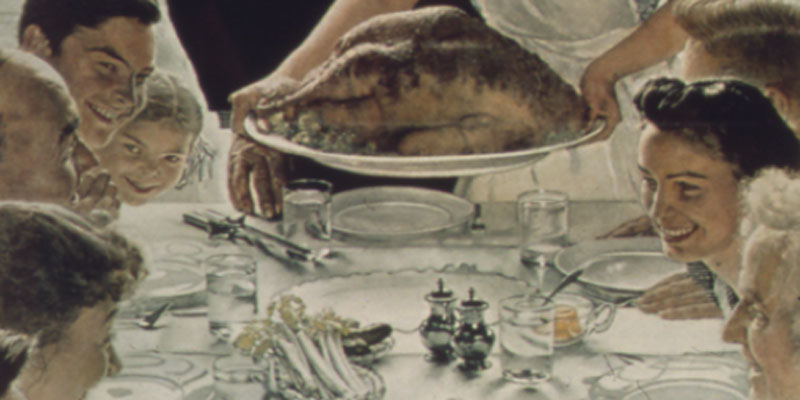
An Object for Our Thanksgiving Gratitude
Among the many mailing lists that send messages to my email account is one for the Providence College friars — the actual friars, that is — and this week, one of them sent a Thanksgiving message with an anecdote about a foreign novitiate. This newcomer to our country and to the religious order expressed surprise and admiration that our country sets aside a public day of thanksgiving to God.
Seeing the day through the young man’s eyes can be a bit startling for a born-and-raised American. Wait! That can’t be what the day is for, can it? Isn’t it really just a celebration of early settlers’ coming together with the indigenous people of the continent? Sure, they might have been offering thanks to God, but we’re recognizing them, not Him, right?
Well… not according to George Washington:
By the President of the United States of America. a Proclamation.
Whereas it is the duty of all Nations to acknowledge the providence of Almighty God, to obey his will, to be grateful for his benefits, and humbly to implore his protection and favor—and whereas both Houses of Congress have by their joint Committee requested me “to recommend to the People of the United States a day of public thanksgiving and prayer to be observed by acknowledging with grateful hearts the many signal favors of Almighty God especially by affording them an opportunity peaceably to establish a form of government for their safety and happiness.”
Now therefore I do recommend and assign Thursday the 26th day of November next to be devoted by the People of these States to the service of that great and glorious Being, who is the beneficent Author of all the good that was, that is, or that will be—That we may then all unite in rendering unto him our sincere and humble thanks—for his kind care and protection of the People of this Country previous to their becoming a Nation—for the signal and manifold mercies, and the favorable interpositions of his Providence which we experienced in the course and conclusion of the late war—for the great degree of tranquillity, union, and plenty, which we have since enjoyed—for the peaceable and rational manner, in which we have been enabled to establish constitutions of government for our safety and happiness, and particularly the national One now lately instituted—for the civil and religious liberty with which we are blessed; and the means we have of acquiring and diffusing useful knowledge; and in general for all the great and various favors which he hath been pleased to confer upon us.
and also that we may then unite in most humbly offering our prayers and supplications to the great Lord and Ruler of Nations and beseech him to pardon our national and other transgressions—to enable us all, whether in public or private stations, to perform our several and relative duties properly and punctually—to render our national government a blessing to all the people, by constantly being a Government of wise, just, and constitutional laws, discreetly and faithfully executed and obeyed—to protect and guide all Sovereigns and Nations (especially such as have shewn kindness unto us) and to bless them with good government, peace, and concord—To promote the knowledge and practice of true religion and virtue, and the encrease of science among them and us—and generally to grant unto all Mankind such a degree of temporal prosperity as he alone knows to be best.
Given under my hand at the City of New-York the third day of October in the year of our Lord 1789.
We do well to reread this text as an antidote to the calls to transform Thanksgiving Day into yet another day of self-recrimination and penance for the sins of our ancestors of European origin.
The contrast with the proclamation of the current occupant of the White House is significant, even though he (surprisingly) resists ritual denunciation. Joe Biden lists various categories of people for whom “we” are to be grateful and then turns the spotlight on himself:
For the First Lady and me, Thanksgiving has always been a cherished time to enjoy annual traditions that have evolved into sacred rituals with our children and grandchildren: throwing the football, preparing family recipes, lighting candles, and setting the table.
We have gone from drawing from the sacred for our traditions to establishing traditions as sacred. That is, we derive profundity not from a power greater than us, but from the small things we do regularly.
One wonders whether it was the implicit secularization of the Thanksgiving Day that left it open to attack. After all, we can cease to dedicate Thanksgiving to God, but we still need something to celebrate, and if that something is a historical event or group of people or annual practice of our families, then we open the door to criticism of these things for their imperfect humanity.
Take special note of President Washington’s call to “beseech” God “to pardon our national and other transgressions.” Make what sacrifices we may to representatives of those against whom our nation has transgressed, nobody other than God is in a position to offer adequate forgiveness.
Featured image by Norman Rockwell on WikiArt.
